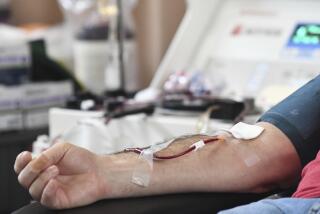High-Risk AIDS Groups Donating Blood : Screening Measures Based on Self-Deferral Called Insufficient
- Share via
WASHINGTON — Individuals in high-risk AIDS groups are continuing to donate blood, despite nationwide recommendations that they voluntarily refrain, government scientists and representatives from the blood bank industry said Monday.
Dr. Harvey J. Alter, chief of the immunology section of the National Institutes of Health department of transfusion medicine, said that a study he is conducting with the Washington chapter of the American Red Cross showed that 88% of donors whose blood had tested positively for exposure to the AIDS virus were members of high-risk groups for the infection, including homosexuals and bisexuals.
He added: “This high proportion of homosexuals offers additional evidence that screening measures based on self-deferral of members of high-risk groups are clearly insufficient.”
‘Change in Focus’ Needed
Dr. Thomas F. Zuck, director of the blood and blood products division of the Food and Drug Administration’s center for drugs and biologics, suggested that increased education “with a change in focus” is needed. Prospective donors should not be asking themselves “whether they are members of a high-risk group,” but whether they have engaged “in high-risk behavior,” Zuck said.
“There is often a ‘this can’t happen to me’ denial,” he added. “We have to ask them the questions. We have to get them out of the mind-set of ‘I’m not a member of a high-risk group, even though I do certain things.’ ”
Their findings were disclosed in testimony before a federal advisory panel convened by the NIH to evaluate the impact of the AIDS antibody blood-screening test, introduced in 1985 to detect and eliminate contaminated blood from the nation’s blood supply.
AIDS, or acquired immune deficiency syndrome, cripples the immune system, leaving the body vulnerable to rare infections, cancers or neurological disorders. Tainted blood or blood products have been responsible for about 2% of the nation’s more than 22,000 AIDS cases. Anyone who receives such blood would be exposed to the AIDS virus--although any blood that tests positive is discarded by blood banks.
Before the test came into use, the federal government and the blood industry urged individuals in high-risk groups--including male homosexuals and bisexuals, intravenous drug users and their sexual partners--to refrain from giving blood.
‘Incredible Drop’
Walter R. Dowdle, coordinator for federal AIDS programs, said that when testing began in 1985, four of every 10,000 donors were confirmed positive for exposure to the virus. That figure has dropped to 1 per 10,000, he said.
“That’s an incredible drop and certainly indicates something is being done right,” he said. “Hopefully, the message of self-deferral is getting around better.”
Confusion about who should exercise such “self-deferral” could have resulted from a change in guidelines. Initially, officials recommended that homosexual men with many partners refrain from donating blood. Later, the recommendation was expanded to include any man who has had sex with another man since 1977, even if there had been just one encounter.
Alter said that “individuals from high-risk groups are still donating blood, thus making imperative a reinforcement of educational programs to improve self-deferral mechanisms.”
Of the 63 confirmed positives in Alter’s study, half “didn’t consider themselves at high risk, or didn’t read or failed to understand” the written information given to them defining high-risk status.
Reasons Given
Alter said that the reasons they donated seemed related “to the relatively low promiscuity of the homosexuals in our study population” or their feeling that antibody screening “would identify any infectious unit and self-deferral was unimportant.”
The FDA’s Zuck said that one study of confirmed positive blood donors showed that “many were found to have risk factors for infection, but did not consider themselves at increased risk.” Others, he said, “admitted risk factors but feared loss of anonymity about their life styles if they failed to donate.”
Zuck recommended that video presentations or other improved educational techniques be used to reach those “60 million Americans of marginal literacy” who either cannot read or fail to understand the material explaining criteria for self-deferral.
Dr. S. Gerald Sandler, associate vice president for medical operations of the American Red Cross, said that information obtained from confirmed positive Red Cross donors indicated that more than 75% had AIDS risk factors, “although they had not identified themselves as individuals in high-risk groups at the time of donation.”
Thus far, there has been only one documented instance of infected blood slipping past the screening procedure. In that instance, a donor who had been exposed to the virus gave blood before antibodies had formed.
Controversy grows over private blood banks. Part V, Page 1.
More to Read
Sign up for Essential California
The most important California stories and recommendations in your inbox every morning.
You may occasionally receive promotional content from the Los Angeles Times.










